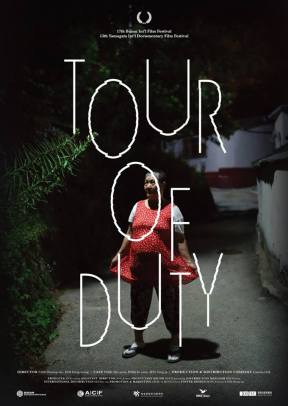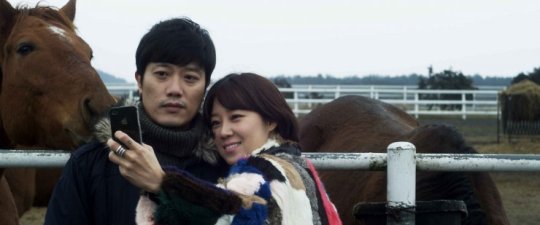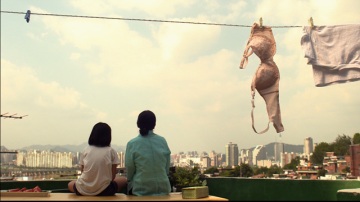The Korean education system is infamous for it’s grueling and oppressive culture, and the stress imposed on youngsters has often been the subject of film. Typically such themes appear in the form of teenage horrors, such as the successful Whispering Corridors series, whereby the pressures of constant examinations and competition from other students prove too much to bear for their very souls.
With Pluto (명왕성), director Shin Su-won (신수원) takes a dramatic-thriller approach to the topic and the result is fantastic. Employing the technical prowess and artistic sensibilities that earned her the Canal Plus prize for her short Circle Line (순환선) at Cannes, director Shin deftly explores the weighty subject matter with skill. Even more impressive is that Pluto manages to straddle both the independent aesthetic realm as well as more mainstream territory, a remarkable achievement given that it’s only her second feature film. While some critics have lamented the inclusion of more generic features, it is a wise move on director Shin’s part as it solidifies her name through the industry as a talent to watch.
At a highly prestigious high school that produces some of the most elite students in Korea, top student Yun-jin (Seong Joon (성준) is found murdered in a nearby forest. Immediately suspected is frosty roommate Joon (David Lee (이다윗), yet with a sound alibi his release is assured. Yet Joon knows much more about the circumstances surrounding Yun-jin’s death than he reveals, and gathers the most elite student group at school together to discover the killer.
Pluto begins with all the hallmarks of a highly competent independent thriller, as Yun-jin is stalked in the woods until he meets his untimely demise in suitably shocking fashion. Yet from such humble beginnings director Shin skillfully intertwines such low-budget aesthetics with thriller conventions, as prime suspect Joon is immediately questioned by detectives; however his intelligence proves too great for the officers to cope with, and with zero evidence, he is released. Both realms are consolidated incredibly well through the use of the non-linear narrative as Joon – sporting rebellious blue hair – in the present holds suspects captive as time counts down, while flashbacks to Joon’s admission to the school convey the character driven foundations.
The method is wonderfully effective in articulating the intense pressures enforced on students, whilst simultaneously providing each member of the school motive for Yun-jin’s murder. Director Shin approaches the topic with keen insight – perhaps unsurprising given her history as a teacher – as she emphasises how parental wealth, greedy tutors, and corrupt school officials are all accountable in the creation of highly intelligent yet morally questionable youths. And their actions are certainly unconscionable, as awful acts of cruelty are performed within the elite secret society of top tier students, ranging from sexual assault, bullying, bludgeoning animals and vandalism that ultimately result in suicide and murder.
Yet as ‘evil’ as their deeds are, director Shin fully develops each elite student as a victim in their own right. The lack of parental guidance and the encouraged desire to win at any cost pushes them into psychological instability. Their wildly spinning moral compass is, director Shin conveys, the result of a fundamentally corrupt education and class system that is doomed to repeat itself. The narrative wonderfully explores what happens when someone dares to challenge such a system through Joon, as he attempts to breach a social and educational class supposedly beyond his reach. Joon’s creativity and alternative perspective on life is brilliantly realised through his discussion on Pluto’s demotion, a theory that superbly encapsulates the very essence of the story – the belief that the sun/exam results are the center of the universe/life is not only flawed but wholly arrogant.
Lee David (이다윗) is highly competent in his performance as Joon. The novice actor does well in conveying an initially hopeful and interesting young man whose jealousy and desire leads him on a darker path. As his originality and creativity are quashed for the sake of exam results, the transformation into amorality is wholly believable.
Yet despite so many positive accomplishments, the final act was lamented by some critics for its use of generic conventions. This is an understandable criticism although one that is somewhat nitpicking. What director Shin has achieved with Pluto is remarkable, as she has taken a film with a keen social message and made it mainstream; a two-for-one in promoting debate on a serious Korean issue as well as solidifying her reputation as director of talent.
Verdict:
Pluto is an excellent exploration of the intense Korean education system, and the highly intelligent yet morally questionable youth that it creates. It’s a stunning feature film from director Shin Su-won, whose keen eye for symbolism and character study is articulated throughout. One of the great strengths of the film is the manner in which director Shin combines both the independent aesthetic with the mainstream thriller, simultaneously promoting debate on an important social issue as well as cementing herself as a quality director. Thoroughly recommended.
★★★★☆




























































